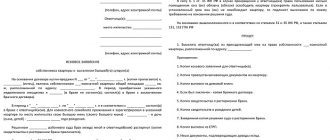Do without the help of the court
Resolving the issue through the justice system takes a lot of time. The priority is to reach a compromise without the participation of an independent arbitrator. In pre-trial proceedings, you can explain to your opponent, orally or in writing, the consequences of the dispute and possible options for agreements.
The interested party should support its arguments with documents confirming ownership of real estate (extract from the Unified State Register of Real Estate, purchase and sale agreement), and also argue for the loss of the right of residence by the subject. It would be a good idea to enlist the help of a lawyer.
To voluntarily evict, a citizen needs to contact the passport office or department of the Federal Migration Service and fill out a departure form.
When is forced deregistration possible?
If there is no agreement, a person can be discharged through the court. However, there must be compelling reasons for discharge.
| From council housing | From a privatized apartment |
| Failure to pay utility bills for more than 6 months in a row | Severance of marital relations with the owner of the home: divorce, separate household management |
| Long absence of a person from the place of registration | Change of owner of the premises: donation, sale of an apartment, etc. |
| Gross disturbance of the peace of other residents (hooliganism, violation of silence, etc.) | |
| Use of premises for purposes other than their intended purpose: organization of production, warehouse, brothel, etc. | |
| Failure to comply with sanitary and hygienic standards | |
| Expiration of the period for providing housing under a rental agreement | |
| Damage to the apartment | |
| Illegal registration: concluding a social rental agreement in violation of the law | |
The procedure for eviction from a municipal apartment can be initiated by the tenant, members of his family and the landlord. Most often, people are discharged from housing due to the person’s prolonged absence from the address. However, temporary factors - business trips, treatment - are considered valid reasons for not residing at the place of registration.
Discharging your ex-wife from the apartment will not be difficult. This process is regulated by the norms of the Civil Code of the Russian Federation:
- – the owner disposes of his property as he wishes;
- – ownership rights terminate upon alienation of property to other persons.
The situation is more complicated with the discharge of a person who refused to participate in privatization. Such a citizen receives the right to unlimited use of the apartment.
For forced discharge, the subject must:
- I have not lived in the apartment for a long time (based on judicial practice, this is at least six months).
- Left the premises on a permanent basis, removed things ();
- He left the apartment voluntarily.
- Didn't pay utilities).
- He did not try to move into the home again, and if he did, he was not prevented from doing so.
You should act a little differently when adult children need to be discharged by court decision. To do this, they are recognized in court as former family members. In accordance with this, this is possible under a combination of the following conditions:
- Adult children do not maintain a common household with the owners. They have separate budgets.
- Citizens do not provide each other with support and assistance; on the contrary, conflicts arise between them.
- Children do not live in the apartment and do not pay for utilities.
The removal of a minor child from any property is possible only if he is provided with equivalent residential premises. At the same time, guardianship authorities are involved in the court proceedings to check the living conditions in which the children will be.
Detailed procedure for going to court
For forced deregistration, a court order is required to deregister the subject. To do this, it is useful for the property owner to know which court is discharging the person from the apartment.
The main role is played by the territorial factor. You need to contact the magistrate’s court at the place of residence of the plaintiff (applicant) or the location of the object of the dispute (apartment).
The property owner must take the following actions:
- Draw up a statement of claim indicating the reason for the resident’s discharge.
- Collect a package of documents.
- Pay the court fee.
A person can be discharged from privatized housing only on the initiative of the apartment owner. In the case of municipal premises, persons registered there and even neighbors have the right to submit an application.
Sample claim:
Usually the following is attached to the application:
- a receipt stating that the state fee for extracting from the apartment was paid (300 rubles);
- a copy of the plaintiff's passport;
- an extract from the Unified State Register of Real Estate, a social tenancy agreement depending on the type of rights to the premises;
- copies of the claim and other materials for the defendant and third parties.
The set of documents attached to the claim depends on the basis for deregistration.
The content of the statement deserves special attention. In the document, the interested party must clearly state the requirements and justify them. This can be done in any form, since the statement of claim for exclusion from the apartment is not a standard document.
The time frame for consideration of a case varies depending on the complexity of the dispute. However, according to legislative regulations, procedural proceedings should not exceed 2 months.
Grounds and reasons
When filing a claim in court to discharge a tenant, the applicant must have compelling reasons for such a request .
Reasons for discharge permitted by law:
- The couple, who lived in the same apartment, filed for divorce . If one of them is the owner or tenant of the apartment, then after the divorce the second one loses the right to live in the apartment. We talked in more detail about how, after a divorce, ex-spouses and children can be discharged if they are not homeowners, here.
- A citizen registered in an apartment has not actually lived on its territory for a long time. If he is not its owner, then he can also be evicted, citing an unwillingness to pay for utilities for him.
- The tenant violates the living conditions in the apartment : behaves hooliganly, makes noise at inappropriate times, or commits other antisocial acts. In this case, the expulsion and eviction of a citizen is possible only with prior warning.
- The building in which the apartment is located is in disrepair and is subject to demolition . In this case, the residents are discharged and given new housing.
- The tenant is avoiding paying utility bills . In such a situation, you can only write out the tenant of the apartment or a citizen who is not its owner. Moreover, the period of non-payment must be at least six months, and the fact of lack of payments must be documented.
- The apartment was received by the owner as a gift - in such a situation, he has the right to discharge all citizens who are registered in it, without the consent of the persons being discharged.
- The citizen registered in the apartment is in prison or undergoing compulsory military service . In this case, he can also be discharged from housing without any problems.
This basis for deregistration applies only to situations with social housing - in this case, the owner of the apartment cannot be removed from the registration register.
It is worth considering that the listed grounds differ depending on who the offender is - the owner of the apartment, a simple tenant or a tenant under a social tenancy agreement .
Features of discharge in different situations
Municipal apartments belong to the state. The operation of such premises is carried out under a social tenancy agreement. Before discharging a person from an apartment through the court, you need to take two steps:
- Notify local authorities of the tenant's inappropriate behavior ().
- File a claim for eviction and deregistration of a citizen.
After this, you can go to court with a statement of claim and other documents.
Also, according to, a citizen has the right to a forced exchange of a municipal apartment.
Privatized real estate is the personal property of a person. Only the owner has the right to initiate forced deregistration of residents. To do this, he must apply to the court to be discharged from the subject’s apartment. Usually deregistration occurs without problems, but sometimes the court takes into account the financial condition of the defendant and obliges the apartment owner to wait until he finds another place to live.
A husband and wife usually take part in privatization together. A co-owner of an apartment may renounce a share in the premises for the right to live in it for life. Then an exchange of housing is made, but only with the consent of the ex-spouse.
If a person received an apartment under a gift agreement, he has the right to register registered citizens. This cannot be done when persons do not have other living space in their possession ( ).
A person registers ownership of a cooperative apartment after paying all share contributions. If the spouses purchased it jointly, each of them has a share in the premises. Most often, eviction from such living space is carried out through the court. The grounds for deregistration are the same as in the case of a privatized apartment.
Find out more about marital property.
Forced eviction from an apartment through the court is impossible if the corresponding clause is stated in the marriage contract, as well as in the case where the undesirable person:
- Is the owner or co-owner of the property.
- I contributed at least part of the share for the cooperative apartment.
- Absent from the place of registration for a valid reason.
This list is not exhaustive.
The court decision on the forced deregistration of a citizen must enter into force. After this, the document is sent to the territorial authority for migration issues under the Ministry of Internal Affairs. Deregistration is carried out within 3 days from the date of receipt of the decision.
How to expel a non-owner from a house without consent through the court
From a lawyer
First of all, it is necessary to determine the chances of a successful outcome of the case. In order to strengthen these chances, it is better to seek help from a lawyer or attorney. By working together with a professional, it will be possible to provide the court with undeniable evidence that you are right.
Procedure and procedure
The purpose of going to court is to recognize the loss of the right to use residential real estate. Often there is a need, in addition to deregistration, to evict a citizen. In this case, the plaintiff files two statements of claim. Litigation in the registration category is considered by district or city courts.
IMPORTANT! To expel citizens from private households, it is necessary to apply not to the court, but to the Department of Internal Affairs or the MFC (“My Documents”). According to Federal Law No. 5242-1 of June 25, 1993, the corresponding service is also provided by passport offices at the management company.
Instructions for removing a person from home without his consent:
- Notifying the tenant of eviction through the court. According to the Code of Civil Procedure of the Russian Federation, Art. 113, it is impossible to discharge a citizen without notifying him of his intentions. The notice is a subpoena. Having received the notification, the defendant signs, confirming the fact of familiarization. After which the notice is sent back to the court. If there is no signature of the addressee on the notification, it is considered executed.
- Drawing up a statement of claim. The statement of claim is drawn up taking into account the circumstances of the case. Each case is individual. It's better to contact a professional. It will help formulate a number of demands into a common goal and draw up several claims.
- Submitting documents to the court. You must first pay the state fee at the courthouse or at the bank cash desk. After the package of documents is completely collected, they are transferred to the secretary at the reception of the district or city court. Documents are checked for legal literacy. If there are no complaints, the secretary of the court office accepts the documents, issuing a receipt of acceptance. If the contents of the collected package are incorrect, documents will be refused to be accepted in order to eliminate them.
- Attendance at preliminary hearings. According to the Code of Civil Procedure of the Russian Federation, paragraph 1 of Art. 154, the period for consideration of a claim by a district court varies within 2 months. After accepting the submission of documents, the judge sets a date and time for the preliminary hearing. The plaintiff has the right to petition the court to file judicial requests with the following authorities: pension fund, insurance companies, passport offices, management company, clinic, etc.
- Participation in hearings. In the absence of the plaintiff or his representative at the hearings, the court makes a decision in absentia to remove the citizen from the living space (Civil Procedure Code of the Russian Federation, Part 4, Article 167). The owner calls witnesses and explains each claim. Based on the evidence presented, the judge makes a decision.
- Receiving the final court decision. An absentee or in-person court ruling comes into force one month from the date the hearing ends. According to the Code of Civil Procedure of the Russian Federation p. 321, another 7 days may be assigned for the defendant to appeal the court decision. If such a need does not arise, the plaintiff receives a copy of the court decision in the office.
- Extract from a private household. The last stage in resolving this issue is the decree of seals on the removal of a citizen from registration. This procedure is carried out by employees of the district department of internal affairs or the MFC. It is also possible to apply through State Services or with registration at a new address.
This is important to know: Why do you need an archival extract and how to get it
Statement of claim for discharge from a private home without consent
Contents of the claim:
- Name of the court, address, full name and contact details of the parties. Next, indicate the price of the claim (0 rubles) and the amount of state duty (see below),
- Description of the circumstances of the appeal (full name of the plaintiff, address of the house, registration details of the defendant (date). It should be noted that the citizen has been absent from the house for a long time, the absence of obstacles from the plaintiff and his family members, the absence of the defendant’s personal belongings in the house, neglect of household duties or debts Provide evidence in accordance with housing, family and civil legislation.
- Basic requirements (recognize the lost right to use residential real estate on the part of the defendant),
- List of documents attached to the statement of claim,
- Date in the format “hh.mm.yy”,
- Plaintiff's signature.
on recognition as having lost the right to use residential premises and deregistration
From a lawyer
The strategy for protecting interests depends on a clear statement of the owner's requirements. The lawyer will draw up a clear plan for you and select the most compelling facts for a successful resolution of the issue.
Required documents
Collection of documents is the most important part of the process, since the judge pays attention only to those documents that confirm the plaintiff’s case.
List of documents for applying to the court:
- A copy of the plaintiff's passport,
- A document confirming ownership of a private house,
- Grounds for the acquisition of real estate (sale and purchase agreement, certificate of inheritance, deed of gift in favor of the plaintiff, change agreement, etc.),
- An extract from the house register is required,
- If former spouses are discharged, then a certificate of divorce;
- Written evidence of the fact that the claim was sent to the defendant (for example, postal items with a stamp or signature of the defendant on receipt, a written refusal is issued voluntarily);
- Receipt for payment of state duty,
- Other documents if necessary.
As mentioned earlier, the secretary checks the correctness of the package of documents. If all conditions are met, the documents are submitted to the court for consideration.
IMPORTANT! Copies of all documents are submitted according to the number of persons participating in the process. In accordance with the specified data, the secretary notifies that the case has been transferred to court.
Discharge of a resident without his presence
There are several ways to remove a tenant from a living space without his consent:
- By the tribunal's decision,
- By proxy,
- Simultaneous registration at a new address.
The main reasons for a person’s failure to appear at the registration authorities for discharge:
- Residence in another city,
- Declared dead or missing,
- Stays in prison
- Seriously ill,
- Lost the right to use housing by court decision.
If a person lives outside the Russian Federation, he has the right to contact the migration service by mail with an application for deregistration by mail to the migration service.
Dates of discharge
Since each case is individual, the exact time frame for litigation is uncertain.
Main deadlines:
- Familiarization with the statement of claim – from 5 days to 2 months,
- Preliminary and main hearings – up to 1 month,
- The time to appeal is 1 month.
This is important to know: Types and samples of certificates from the house register
The defendant can extend the time frame for the consideration of the case by filing endless complaints. This often happens due to the lack of necessary knowledge on the part of the plaintiff. In order not to waste a lot of time and effort on litigation, you should use the services of experienced lawyers or an attorney.
Be sure to read how to discharge a temporarily registered person without his consent.
State duty and expenses
Litigation is a costly process. The minimum cost is payment of the state duty, which is 300 rubles. Provided that the defendant has several claims, the amount of the state duty may be increased.
Along the way, there will be a need to contact a notary, for example, to approve a purchase and sale agreement. You should clarify the cost of legal services in advance.
Arbitrage practice
Expert opinion
Golubev Denis Petrovich
Lawyer with 7 years of experience. Specialization: civil law. Author of dozens of articles in the media
The court often goes “halfway” to the defendant. For example, if he has nowhere to live or temporarily does not live at his place of registration due to his studies. The judge's decision depends on the demands made by the defendant. In the process of studying the appeal, the court carefully examines all the circumstances of the case. It happens that the court grants a deferment for discharge/eviction from the house. The law does not provide for an exact period of deferment, but on average the defendant is given from 3 months to 2 years.
Example.
District Court
Tula considered the case of A.V. Kondratiev, who filed a claim for the discharge of a deceased resident of a private house. The man got the property under a gift agreement, but a distant relative of the donor was in the house. He retained the right to live in a private house - he did not have any shares. After living in the house for a while, a distant relative left in an unknown direction. After 8 months it became known that he had died.
Kondratyev was not a close relative of the deceased, so he was not given a death certificate. The deceased had no other relatives, so the original certificate was in the registry office. Kondratyev contacted the Department of Internal Affairs directly at the place of registration of the property. But there he was told that his discharge would not take place without a court decision.
The man filed a claim in court to remove the deceased from the registration register. At the preliminary hearing, Kondratyev petitioned the court to submit a request to the registry office. Soon the answer came. And the death certificate of the relative was provided to the court. The deceased was discharged from a private home.
When deciding on the discharge, the court took into account that Kondratyev actually received the house under a donation agreement (Article 572 of the Civil Code of the Russian Federation), registered ownership (Article 209 and Article 292 of the Civil Code of the Russian Federation), as well as the established fact of the death of the tenant (Clause 1 of Art. 278 Code of Civil Procedure of the Russian Federation). Thus, Kondratyev filed one claim for recognition of the loss of the right to use residential premises on the part of a deceased relative.
Appeal against forced discharge
Sometimes, due to the fact that the plaintiff deliberately keeps silent about the facts of the case or the location of the defendant, the court makes a decision in absentia to deregister the citizen. In this case, the victim needs to know how to challenge the extract from the apartment.
A citizen whose interests have been violated must do the following:
- Carefully study the contents of the claim and the attached evidence.
- Submit an application to cancel the default judgment. In the complaint, explain that the reasons for not being registered at the address were valid, and the defendant did not know about the court proceedings.
- Support your position with witness testimony.
Another way to protect yourself from eviction due to absence from your place of residence is to submit an application to the management organization in advance about leaving on a business trip, for treatment, and so on.
Price
How much does it cost to discharge a person from an apartment through the court? The procedure for checking out of an apartment is free , but some costs will still be incurred during the process. Their list and cost depend on what services the parties to the case used.
In general, the cost of the statement will consist of:
- State fees - this type of expense is mandatory for the plaintiff. The amount of the state duty in this case is:
- 200 rub. – if the applicant is an individual;
- 700 rub. – if the applicant is a legal entity.
- Attorney services - these costs will be incurred only if one of the parties decides to seek legal support from a specialist.
- Notary services – in case you need notarization of any documents attached to the case.
The amount of expenses for legal services, if any, directly depends on the prices of a particular specialist, but in any case their amount will be considerable.









